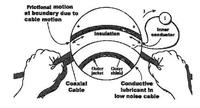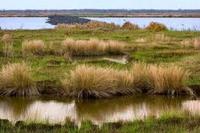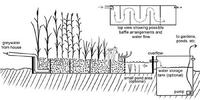-
ASCB: U.S. scientific research will "pay dearly" for shutdown
The American Society for Cell Biology (ASCB) added its voice to those of other scientific and professional groups in warning that the federal government’s partial shutdown will hurt patients, researchers, and especially the U.S. research effort, long after an agreement to end the impasse is reached. “As America keeps hitting the brakes on scientific research, we are, in effect, accelerating the damage done to our continued leadership in global bioscience, in health outcomes and in the economic power that we have always derived from basic research,” Dr. Bertuzzi, executive director of the ASCB said. “Americans will pay dearly for these slowdowns, sequestrations, and shutdowns in finding cures and on maintaining economic competitiveness.”
-
-
Sea power: extracting energy from ocean waves

As sources of renewable energy, sun and wind have one major disadvantage: it is not always sunny or windy. Waves in the ocean, on the other hand, are never still. Researchers are now aiming to use waves to produce energy by making use of contact electrification between a patterned plastic nanoarray and water.
-
-
Compact, high-power terahertz source at room temperature developed

Terahertz (THz) radiation — radiation in the wavelength range of 30 to 300 microns — is gaining attention due to its applications in security screening, medical and industrial imaging, agricultural inspection, astronomical research, and other areas. Traditional methods of generating terahertz radiation usually involve large and expensive instruments, some of which also require cryogenic cooling. Researchers have developed a compact, room-temperature terahertz source with an output power of 215 microwatts.
-
-
ACS: Shutdown undermines U.S. innovation, competitiveness, critical services
American Chemical Society (ACS) president Marinda Li Wu said that the budget impasse is effectively choking America’s science innovation pipeline, strangling new discoveries, future economic growth, and job creation. “[T]o shut down a critical part of our nation’s research and innovation pipeline puts our nation at a severe competitive disadvantage globally,” said Wu. “A government shutdown that closes the world’s largest research system can lead to unintended negative consequences putting at peril America’s economic growth and long-term stability.”
-
-
Research investments, growing markets drive rise in energy patents

Innovation in energy technology is booming, according to a new paper which examines what factors set the pace for energy innovation. The study finds that investments in research and development, as well as in the growth of markets for these products, have helped to spur this dramatic growth in innovation.
-
-
Long-term trend of saltwater intrusion in the Everglades confirmed
Mangroves love salt water, while sawgrass depends on fresh water. Satellite imagery over the southeastern Everglades confirms long-term trends of mangrove expansion and sawgrass habitat loss near the shore. The trend is related to salt water intrusion caused by sea-level rise and water management practices. Changes in water management, such as the implementation of the Comprehensive Everglades Restoration Plan, may help offset the possible effects caused by future salt water intrusion, but restoration may not suffice if sea-level rise accelerates.
-
-
N.J. coastal wetlands moderated some of Hurricane Sandy’s fury

Monitoring sensors along the New Jersey coast recorded marsh and wetland swelling during Hurricane Sandy. That swelling is an indication of marshes’ ability to absorb some of the storm surge — which, in hard-hit urban areas, had resulted in high water marks up to seven feet during Hurricane Sandy. Resilient, healthy wetlands near coastal areas have a key role in protecting local communities from hurricane-induced storm surges and flooding.
-
-
Policies governing rural land use can curb wildfire risks – up to a point
Using Montana’s fast-growing Flathead County as a template, researchers hves found that moderately restrictive land-use policies can significantly curb the potential damage of rural wildfires. Highly restrictive planning laws, however, will not do much more.
-
-
U.S. adults fare poorly on international skill test
A just-completed international test of adults in math, reading, and problem-solving using technology offers a grim message to the United States. The test focused on skills deemed critical for global competitiveness and economic strength, and American adults scored below the international average. It tested about 166,000 people ages 16 to 65 in thirty-three countries and subnational regions. Adults in Japan, Canada, Australia, Finland, and multiple other countries scored significantly higher than American adults in all three areas on the test.
-
-
USAF partners with national labs to improve aircraft component design
Working with national laboratories, universities, and industry, the Air Force is ensuring it stays on the cutting edge of global security by creating a new engineering paradigm to improve the safety and fuel-efficiency of aircraft.Materials research engineers at the Air Force Research Laboratory (AFRL) have partnered with national laboratories to model defects and study materials at their grain level in an effort to develop and advance the design of systems used by the military personnel, including aircraft.
-
-
First ever evidence discovered of a comet striking Earth

The first ever evidence of a comet entering Earth’s atmosphere and exploding, raining down a shock wave of fire which obliterated every life form in its path, has been discovered. The comet entered Earth’s atmosphere above Egypt about twenty-eight million years ago. As it entered the atmosphere, it exploded, heating up the sand beneath it to a temperature of about 2,000 degrees Celsius, and resulting in the formation of a huge amount of yellow silica glass which lies scattered over a 6,000 square kilometer area in the Sahara.
-
-
Reducing urban water leakage
No resource is more fundamental to life and human society than water. Yet, globally, 25 to 30 percent of drinking water is lost every year due to leakages in urban water distribution systems. An EU-funded project is proposing an innovative solution for the automatic detection, sealing, and curing of typical network pipes, without digging up pavements and roads.
-
-
Bolstering water security in a crowded world

With limited water and the increasing number of people depending on it – there will be more than nine billion people on the planet by 2050 — water security is tenuous. Integrated water management plans using “blue,” “green,” and “gray” water, however, can increase water security by allowing agriculture to rise to the challenge of feeding a growing world population while leaving enough water for other uses.
-
-
Government shutdown stymies U.S. science agencies
A U.S. Government furloughs affecting virtually all National Science Foundation (NSF) employees and three-fourths of those at the National Institutes of Health could impact American competitiveness, the American Association for the Advancement of Science (AAAS) warned. “If the government shutdown continues for a week or more, it is going to make the United States less desirable as an international research collaborator,” said an AAAS representative. “When funding is no longer reliable, many of our research partners may be unable to continue collaborating with us. That could eventually have longer-term impacts on American innovation and competitiveness.”
-
-
Reducing security threats from explosives
Researchers, as part of the Awareness and Localization of Explosives-Related Threats center (ALERT), a DHS Center of Excellence, are working on ways to detect explosives and neutralize their impact. The researchers are developing portable detectors as well as larger systems to scan for explosives. Some technologies will analyze the spectrum of light shining through vaporized samples; others will analyze solid residues.
-
More headlines
The long view
Autonomous Vehicle Technology Vulnerable to Road Object Spoofing and Vanishing Attacks
Researchers have demonstrated the potentially hazardous vulnerabilities associated with the technology called LiDAR, or Light Detection and Ranging, many autonomous vehicles use to navigate streets, roads and highways. The researchers have shown how to use lasers to fool LiDAR into “seeing” objects that are not present and missing those that are – deficiencies that can cause unwarranted and unsafe braking or collisions.
Tantalizing Method to Study Cyberdeterrence
Tantalus is unlike most war games because it is experimental instead of experiential — the immersive game differs by overlapping scientific rigor and quantitative assessment methods with the experimental sciences, and experimental war gaming provides insightful data for real-world cyberattacks.
Prototype Self-Service Screening System Unveiled
TSA and DHS S&T unveiled a prototype checkpoint technology, the self-service screening system, at Harry Reid International Airport (LAS) in Las Vegas, NV. The aim is to provide a near self-sufficient passenger screening process while enabling passengers to directly receive on-person alarm information and allow for the passenger self-resolution of those alarms.
Falling Space Debris: How High Is the Risk I'll Get Hit?
An International Space Station battery fell back to Earth and, luckily, splashed down harmlessly in the Atlantic. Should we have worried? Space debris reenters our atmosphere every week.
Testing Cutting-Edge Counter-Drone Technology
Drones have many positive applications, bad actors can use them for nefarious purposes. Two recent field demonstrations brought government, academia, and industry together to evaluate innovative counter-unmanned aircraft systems.
Strengthening the Grid’s ‘Backbone’ with Hydropower
Argonne-led studies investigate how hydropower could help add more clean energy to the grid, how it generates value as grids add more renewable energy, and how liner technology can improve hydropower efficiency.
